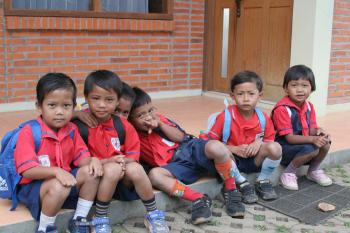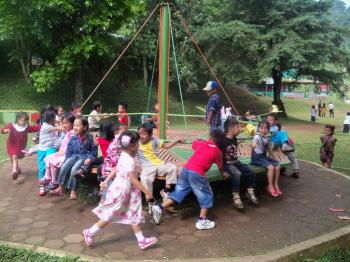Inequality is increasing

Ready to go to school! (photo: SOS archives).
The area is a popular tourist destination due to its natural sites and cool climate. The area around Lembang is very fertile and agriculture is the main way in which people make a living. Very often the products are then sold on the streets and markets of Lembang.
The level of unemployment, however, remains high. Those with a low level of education, women and young people find it hardest to get a job. In addition, much of the work that is on offer is informal, seasonal and badly paid. In the recent past there has been an increase in inequality between people – while some segments of the population have benefited from the more favourable economic situation, many remain trapped in the cycle of poverty. Many such families are living in very precarious conditions, and basic infrastructure is often missing. Children growing up in these circumstances are very vulnerable, since they are exposed to illnesses associated with malnutrition and poor sanitation facilities. Some parents here do not manage to provide their children with the amount and type of food they require. Other parents manage to meet the basic needs but can only dream of sending their children to school. These social and economic conditions have a huge impact on family life, and many fall apart, leaving children without parental care.
Providing families with the support they need
SOS Children's Villages started working in Indonesia in the early 1970s. The country has experienced many changes in the decades since, and our activities have increased over time in order to reach a growing number of vulnerable families and children. Our most recent family strengthening programmes are adapted to the needs of the local population.
What we do in Lembang

Children can play oustide in a safe environment (photo: SOS archives).
For children whose families can no longer take care of them SOS Children's Villages provides a loving home in one of the 13 SOS families, where they grow up with their brothers and sisters and are cared for by an SOS mother. These children can attend the SOS Kindergarten, where they are taught together with children from local families. Older children can attend the SOS primary school, which provides them with a sound education and helps them become part of the local community.
When young people are ready to move out of the SOS families they join our SOS Youth Programme when they start vocational training or go on to higher education. With the support of qualified professionals, the young people develop perspectives for their future, learn to shoulder responsibility and increasingly make their own decisions.